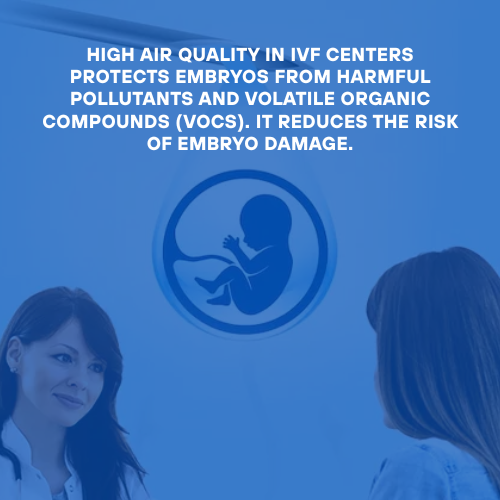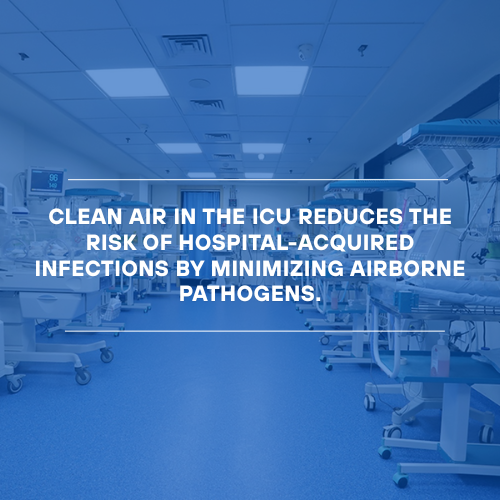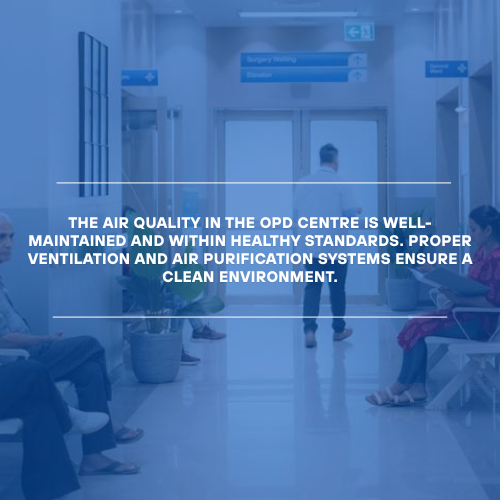
IVF CENTERS
The IVF Centre assists couples in becoming parents and spreading joy in their lives. We understand how success rate becomes an important factor when couples are deciding on which IVF center they should choose. IVF process can be an exciting and nerve-wracking experience for anyone needing help in conceiving a child. Fortunately, we have air purification experts who can assist you in increasing your success rate by maintaining air quality as per WHO guidelines, allowing you to benefit your customers more sustainably. An estimated 15% of people have difficulty conceiving due to Stress, environmental pollution, diet, sexually transmitted diseases, and obesity. Providing the appropriate environment for fertilization is one of the most important steps in IVF. Airborne pollutants are critical in IVF facilities where air quality in laboratories and clinical procedure rooms can have enormous
effects on embryo quality, embryo survival, and the clinical outcome of IVF treatment. Good air quality may be directly related to the success rate of the IVF procedure. Several gases or groups of gases have been identified as problematic, including volatile organic compounds (VOCs), aldehydes, formaldehyde, nitrogen oxide, and styrene.


ICU NICU OTE
“Pure air protects hospital staff and patients from cross-contamination”
The most exposed place for cross-contamination is the Hospitals and Clinics. The air is always filled with different infections omnipresent in the air. Not only the patients but the staff and the attendants are also affected by the bacteria and viruses. Thus, Infection control is one of the major concerns in hospitals. Advind Healthcare provides purified air solutions that help hospitals to maintain good air quality and control the spread of infection.
Building areas that handle highly contagious patients, require higher-efficiency filtration and ventilation systems. Hospitals, regardless of size or number of buildings, require a functional air ventilation system to protect patients, staff, and visitors from germs. OT, ICU, and Burn Wards treat a variety of patients, most of whom are treated in air-conditioned rooms. Since the air conditioners continue to circulate the foul air throughout the day, these rooms become a magnet for many airborne allergens.
Air purifiers in doctor’s offices and air purifiers in medical facilities are essential for people who are sick. There is a significant body of research that proves the effectiveness of multi-process air purifiers to reduce bacteria and kill viruses. High-quality air purifiers can create a safer, cleaner environment in a medical office.
More healthcare professionals are using air purifiers than ever before.
OPD CLINICS
Hospitals can emit hazardous air pollutants (HAPs) such as mercury and dioxin. These pollutants can contribute to health issues that affect doctors, patients, their families, and the community as a whole.
According to the WHO, Nosocomial infection affected 1.4 million people worldwide. Nosocomial infection occurs in a hospital setting and infects someone who has previously been admitted to the hospital for a different health-related reason.
A doctor sees over a hundred patients on a daily basis in a single enclosed room, exposing him or her to various infections and diseases. patient coughing can introduce contaminants into the air and nearby surfaces. Many patients visit hospitals or clinics on a regular basis for treatment or a health check-up, and they can be the primary source of airborne threats such as infections, viruses, and bacteria.
A patient may have a viral, fungal, or bacterial infection that can harm the health of the doctors, other patients, and staff.
